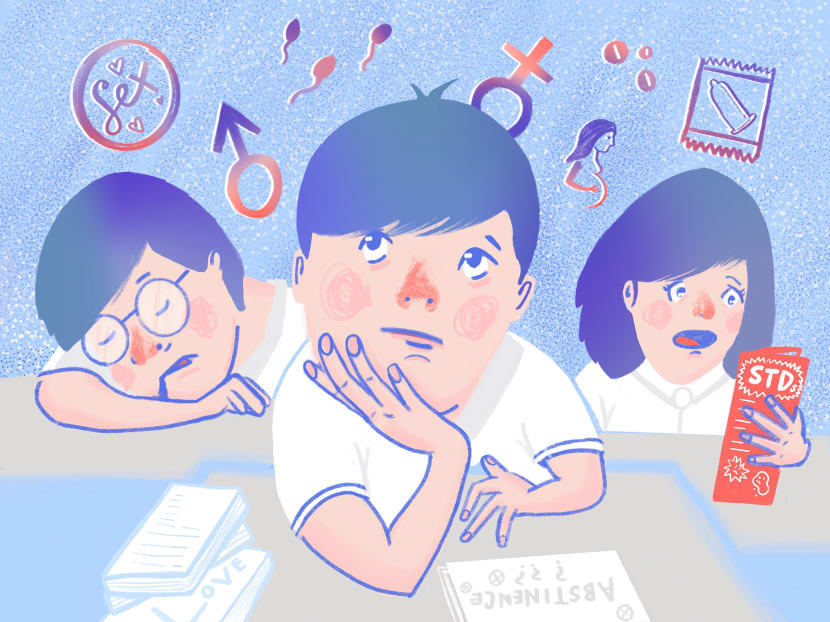Let’s talk about safe sex: Sex education should go beyond preaching abstinence, say students and experts
SINGAPORE — Like many students, Affandi attended sexuality education classes while he was in school. However, the lessons — which he described as “very boring” — did not put him off having sex at age 16.

When asked what an ideal sexuality education would look like to them, students told TODAY that classes should move away from a lecture-style approach and invite more open discussion.
SINGAPORE — Like many students, Affandi attended sexuality education classes while he was in school. However, the lessons — which he described as “very boring” — did not put him off having sex at age 16.
“The topic made me more curious about my body,” said the 21-year-old, who declined to give his real name.
“They keep talking about abstinence and how we should not have sex. It’s not wrong, but I think with young people, the more you tell us not to do something, the more we want to do (it) because we were at the age to try out different things,” he said.
TODAY spoke to several students aged between 14 and 21, and they said that sex education lessons still deliver the same message: Have sex and you will get pregnant or contract sexually-transmitted diseases (STDs).
Whether this message got across to the students is open to question.
A survey conducted by the Association of Women for Action and Research (Aware) last year found that of the 800 young people polled, 60 per cent of those who had sex had not taken any precautions to avoid pregnancy or STDs when engaging in sexual activity.
Aware also found that almost half of the respondents, who are between the ages of 16 and 25, wrongly believed that morning-after pills cause abortions.
Together with its other findings, organiser and facilitator of Aware’s Birds and Bees programme Tan Joo Hymm said the survey indicates that “young people in Singapore do not have comprehensive information about sex and relationships, or perhaps are not putting into practice what they do know”.
‘UNREAL AND UNRELATABLE’
A former Nanyang Girls’ High School student, who wanted to be known only as Abigail, said the materials used in the lessons were often “unreal and unrelatable”.
“We were shown a video where a bunch of guys were talking about having sex and one guy was giving his friend a talk about using condoms. The way he talked just seemed very artificial and overly enthusiastic,” she said.
She added that the “random plot” and “extra effects” made the video “more comical than serious”, which caused her peers to laugh it off and not take the lesson seriously.
Many of the students TODAY interviewed recounted similar experiences.
“I remember quite vividly the relationship rollercoaster that was explained to us. It starts with light petting, heavy petting then sex,” said Temasek Polytechnic student Nur Adrianna Abdul Halim, 19, who added: “At that time, I was like woah, that escalated quickly”.
Another student, Ms Nur Elyana Razali, 20, said that the lesson made her feel “super uncomfortable” and “gave sex a bad image”.
DISCUSSIONS OF GENDER AND SEXUALITY OUTDATED
Meanwhile, 17-year-old student Tay Yi Ting expressed disappointment that the sexuality education curriculum offered at school “simply ignores the existence of LGBT (lesbian, gay, bisexual, transgender) people”.
Recalling a lesson where a handout was given to students which appeared to suggest that the topic of LGBT relationships will be discussed, Yi Ting said that “the term LGBT was never brought up in this hour of class. Queer relationships and people were barely a talking point either”.
Yi Ting recalled that definitions for the terms “homosexuality”, “bisexuality” and “heterosexuality” — which were listed in the handout — were not explicitly given. Instead, the teacher implied that homosexuality and bisexuality are “phases” that one will eventually “get over”.
EQUIP STUDENTS TO MAKE INFORMED DECISIONS: MOE
The aim of the Ministry of Education’s (MOE) sexuality education curriculum is to “equip students with the knowledge and skills to make informed and responsible decisions on sexuality matters”, said Mdm Choy Wai Yin, who is the director of the guidance branch under the ministry’s student development curriculum division.
In primary schools, Mdm Choy said, topics taught during sexuality education lessons include:
Personal safety and how students can protect themselves from sexual exploitation and abuse
Lessons on cyber-safety and how to avoid engaging with strangers online
How to build healthy relationships based on love and respect
At the secondary and junior college level, topics include:
How to manage peer influence
Protection against sexually transmitted infections (STIs) and HIV
Teenage pre-marital sex and pregnancy and how it affects themselves, their families and their futures
Responding to TODAY’s queries on how MOE ensures the curriculum remains relevant to students, Mdm Choy said that “MOE takes into account the prevailing societal trends and expectations. This is balanced with the developmental needs of our students”.
“For example, lesson scenarios have been updated in recent years to include online risks such as the dangers of social networking and sexual grooming, and to emphasise the need to exercise sound judgement at all times, whether the student is engaging in online or offline activities,” she added.
Previously, CNA reported that schools have not engaged external vendors for sexuality education since 2017.
Mdm Choy told CNA that “this is largely because schools feel that the MOE sexuality education programme is able to meet the developmental needs of students”.
“Since students these days are increasingly likely to turn to and confide in their teachers — even on sensitive or personal matters — teachers are better able to support them and help manage their concerns, including on sexuality issues,” she added.
EXPERTS SAY...
Meanwhile, experts told TODAY that a comprehensive sexuality education curriculum should go beyond an abstinence-only approach.
“It’s important to remember that abstinence is just one of the many approaches to contraception. A comprehensive sexuality education curriculum should cover a broad range of contraceptive options, as well as practical skills to negotiate consent in various settings,” Aware’s Ms Tan said.
“After all, very few people practise abstinence all of their lives. If youths do not receive comprehensive sexuality education, they may not have the necessary knowledge or skills when they engage in sex as adults,” she added.
Ms Christina Vejan, executive director for pregnancy crisis and support centre Babes, said that a good sexuality education curriculum should also explain statutory rape, sexual harassment and the legal protections available to victims of sexual harassment and assault.
STUDENTS’ IDEA OF SEX EDUCATION
When asked what an ideal sexuality education would look like to them, students told TODAY that classes should move away from a lecture-style approach and invite more open discussion.
They also called for an expansion of the topics included in the curriculum. Among the topics that students wanted to know about include how to deal with STDs, safe sex and the services available to young people with unwanted pregnancies.
Some said that there should be opportunities to discuss consent, how to manage the emotional aspects of relationships and sex and LGBT relationships and identities.
Ultimately, young people still believe that there is value to having sexuality education lessons in the classroom. However, students — like Ms Adrianna — argue that a change in approach is necessary to make the topic more palatable.
Agreeing, Ms Elyana said: “Instead of telling us sex is bad, tell us how to practise safe sex and understand the consequences of our actions. Sex-ed should be about giving us a safe space to talk about our bodies, raise questions and share experiences in a non-judgemental space.”
REINVENTING SEX EDUCATION
Meanwhile, some young people have chosen to reinvent sexuality education on their own terms.
Ms Junel Seet, 22, is one of the four young adults behind Shy, a platform that aims to improve sexual health literacy among Singaporeans.
On their website, young people can find informative articles, a glossary of topics related to sexuality and sexual health, and a curated question-and-answer segment featuring responses from licensed medical professionals.
In response to queries from TODAY, Ms Seet said that sexuality education should also normalise sexual health problems to “encourage students not to alienate sexual health from their usual physical health”.
“We understand that these aren’t easy things to put across to students, but more can be done to make sex-ed classes more practical, relevant and less intimidating,” she added.










